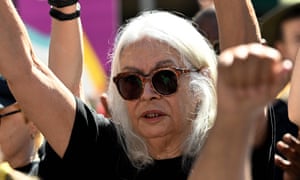[ad_1]
Australians are heading to the polls for a historic referendum that could change their constitution.
They are voting on whether to recognise Indigenous people in the constitution by creating a body to advise on matters affecting Aboriginal and Torres Strait Islander people. The body, known as the Indigenous voice, would offer non-binding advice to parliament and the government on issues such as healthcare and education. Recent polls have suggested the majority of Australians will reject the plan.
Aboriginal activist and academic Prof Marcia Langton says the proposal comes after many years of soul-searching by Indigenous communities to find the best way to ensure they have a say on policies that affect them.
Michael Safi asks Langton about her childhood in the 1950s and the laws that resulted in Aboriginal families such as hers being forcibly separated. Langton describes her growing political awareness and the struggle for Indigenous rights against violent racism in the 60s and 70s, and how segregation was still a fact of life for Indigenous people well into the 1980s.
Langton helped highlight how Aboriginal and Torres Strait Islander children were systematically and forcibly removed from their families by the state until 1967, and the disproportionate number of Indigenous people who die in police custody.
She discusses how closing the gap between the outcomes for Indigenous and non-Indigenous people now requires a different approach – and why she thinks the Indigenous voice is the first step in this.

Photograph: William West/AFP/Getty Images
Support The Guardian
The Guardian is editorially independent.
And we want to keep our journalism open and accessible to all.
But we increasingly need our readers to fund our work.
[ad_2]




